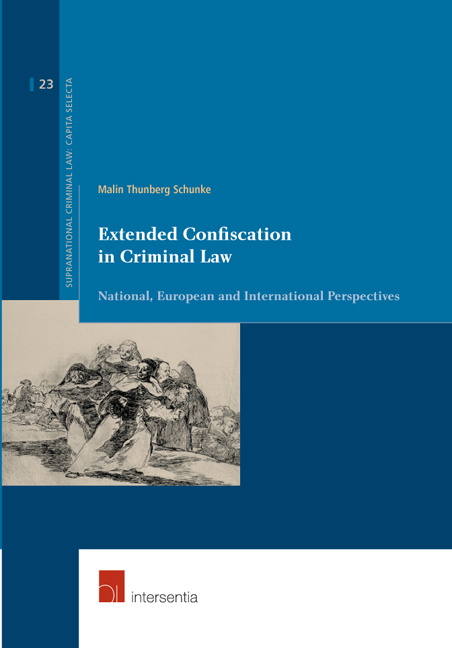Book contents
- Frontmatter
- Preface
- Contents
- Table of Cases
- List of Abbreviations
- Part I Introduction
- Part II Substantive Provisions on Extended Confiscation
- Chapter 2 Legislative Action by the EU
- Chapter 3 Legislation in England and Wales
- Chapter 4 Legislation in Germany
- Chapter 5 Legislation in Sweden
- Chapter 6 Brief Overview of the Legislation in Norway, Denmark and Finland
- Chapter 7 Directive 2014/42/EU: A Reform with Significant Legal Changes?
- Part III The Legal Framework for International Cooperation
- Bibliography
- Index
- About the Author
Chapter 7 - Directive 2014/42/EU: A Reform with Significant Legal Changes?
from Part II - Substantive Provisions on Extended Confiscation
Published online by Cambridge University Press: 11 October 2018
- Frontmatter
- Preface
- Contents
- Table of Cases
- List of Abbreviations
- Part I Introduction
- Part II Substantive Provisions on Extended Confiscation
- Chapter 2 Legislative Action by the EU
- Chapter 3 Legislation in England and Wales
- Chapter 4 Legislation in Germany
- Chapter 5 Legislation in Sweden
- Chapter 6 Brief Overview of the Legislation in Norway, Denmark and Finland
- Chapter 7 Directive 2014/42/EU: A Reform with Significant Legal Changes?
- Part III The Legal Framework for International Cooperation
- Bibliography
- Index
- About the Author
Summary
THE NECESSITY OF A NEW EU INSTRUMENT ON CONFISCATION
At the adoption of Directive 2014/42/EU, the EU legislator primarily argued that the national and international confiscation regimes were “underdeveloped and underutilised”. This conclusion was reached even though it was admitted during the legislative procedure that only limited statistical evidence is available for the actual confiscation practices. In Recital (4) of Directive 2014/42/EU it is therefore stated that the amounts recovered from proceeds of crime in the Union seem insufficient compared to the estimated proceeds. It can be questioned whether it is acceptable that the Union legislator justifies a new instrument with stronger confiscation powers on such a poor statistical basis.
In fact, if the instruments on confiscation presently in force have been “poorly implemented” and seldom used in the Member States, it is quite difficult to argue that the existing rules are insufficient perse. In this respect one must agree with the German Bundesrechtsanwaltskammer:
Es wäre ohne weiteres möglich, in den Mitgliedstaaten Daten dazu zu erheben, welche Erträge aus Straftaten dort anfallen und in welcher Höhe diese Erträge eingezogen werden. Dass dies in der Vergangenheit nicht geschehen ist, berechtigt die Kommission nicht dazu, allein aufgrund eines gefühlten Defizits eine neue Maßnahme vorzuschlagen. Mangels Daten ist in keiner Weise feststellbar, ob die Ma ßnahme überhaupt erforderlich und damit verhältnismä ßig ist.
The difficulties in assessing the real extent of what criminal proceeds are actually being confiscated with the EU in the area of organised crime were further confirmed in the OCP project (Organised Crime Portfolio), which was funded with support from the European Commission. This research project published its final report in 2015, and inter alia concluded that the lack of statistics as well as the differences among the confiscation regimes make it almost impossible to assess and compare the extent of the recovery of criminal assets and to produce a solid statistical analysis.
- Type
- Chapter
- Information
- Extended Confiscation in Criminal LawNational, European and International Perspectives, pp. 189 - 222Publisher: IntersentiaPrint publication year: 2017



